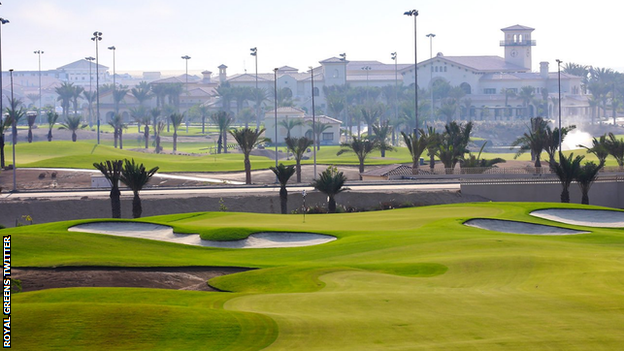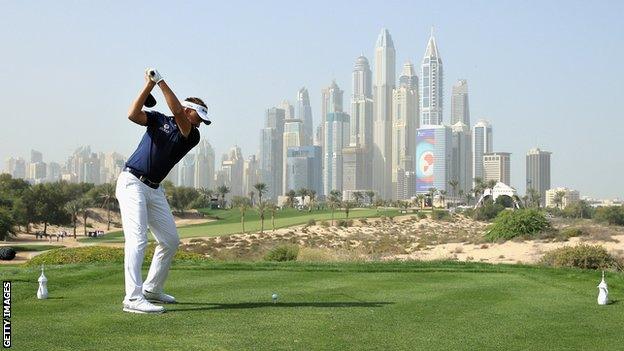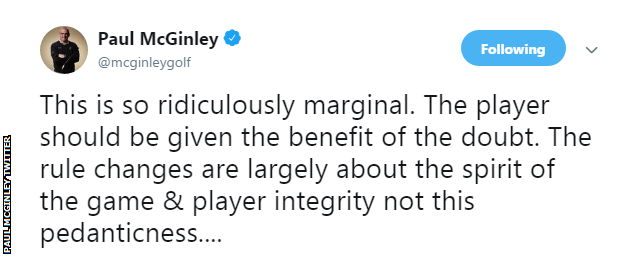European Tour's Saudi Arabia event under scrutiny
- Published

The organisers of the Saudi International say the tournament will showcase the Kingdom is "very much open for business"
Fresh from triumphs on either side of the world, Justin Rose and Bryson DeChambeau head to the same desert destination for an event that puts the European Tour under great scrutiny.
Both players are in pristine form. At Torrey Pines, Rose showed his recent equipment switch did no harm with his 10th PGA Tour triumph, while in Dubai DeChambeau dominated courtesy of his painstaking scientific approach.
But now the rights and wrongs of playing this week's Saudi International come under examination. World number one Rose headlines the strongest field of the year to date as the European Tour breaks new and contentious ground in the Middle East.
Saudi Arabia plans massive investment in golf and will use the sport to help sustain its future economy. For an under pressure tour, constantly being squeezed by big brother US counterparts, this scenario presents a big opportunity.
But they are dealing with a country condemned on human rights, while there was the murder of journalist Jamal Khashoggi at a Saudi embassy just three months ago.
Such issues seemingly had little influence on boss Keith Pelley and his team. As long as their due diligence indicated players and staff would be safe, the Tour would turn up.
And that is what is happening. Questions over the morality of the move have so far been dodged and four of the world's top five players are in attendance.
But European Ryder Cup star Paul Casey is staying away as is fellow Englishman Matt Fitzpatrick. Tiger Woods turned down a reported $2m appearance fee as well as a yacht.
And respected Golf Channel analyst Brandel Chamblee led condemnation, external of the tournament being staged at the Royal Greens club in King Abdullah Economic city.
The former PGA Tour player called the tournament "a PR stunt of the regime" and added: "By participating [the players] are a ventriloquist of this abhorrent, reprehensible regime."
But it is more nuanced than that and the arguments go both ways. Should the European Tour turn its back on the opportunity to stage such a big event? Should players snub the reputed $9m appearance fees being paid?
Why deny themselves when so many international businesses and governments continue to legally trade with Saudi Arabia?
And if the European circuit passed up this chance, would not the PGA Tour be tempted to fill the vacuum? That would be construed as a huge strategic miss by the continental tour, which stages events throughout the Arab region.
Equally, should golf allow itself to be exploited to bolster such countries? Is it not time to take an ethical stand, forgo the riches on offer and enjoy the wealth of the moral high ground?
These are matters of conscience and commercial reality. The notion of right and wrong falls victim.
It is all about the money - for the tour and for its players - no matter how else they try to dress it up. This week is a tidy little earner in terms of dollars and ranking points.

England's Ian Poulter is currently 10th in the European Tour's Race to Dubai rankings
Most players are interested in little else. "I'm probably not the most educated man in the world to sit down and have a discussion about politics," Ian Poulter told BBC Sport.
"I tend to err on the other side and try not to go too deep into that because my IQ is not great.
"Obviously, we all know what's going on around the world, but when I see the tour trying to make good and give us opportunities then I think it is a good thing."
Having tied third in the Dubai Desert Classic, Poulter now sees this week as a chance to compete against the world's best.
"When you see four of the top five are playing, you have to like what that means for the chances of earning lots of world ranking points," he said.
"It's a strong, strong field. Because of that I'm quite excited to get there in the form I'm in."
Other players see a slightly bigger picture. Merseysider Paul Waring, who also shared third place in Dubai, is another to plead ignorance. "From my point of view, I want to go there and see it for myself," he told me.
"You have the media impression but until you actually go and see something for yourself it's actually hard to form a true opinion.
"I believe it is a bit more liberal where we are going and I believe the country as a whole is becoming a bit more liberal, with females being able to drive and that sort of thing.
"I don't think it is where it should be but that's the way it is. If the golf tournament over there helps open a few more eyes along the way then great."
Of less significance than the geopolitical ramifications, last week's Dubai Desert Classic threw up a couple of thought-provoking golfing issues.
DeChambeau's meticulous methods and a harsh ruling against Li Haotong provided big talking points. Li was very unfortunate to be penalised two shots for allegedly being lined up by his caddie on the 72nd green.

McGinley tweeted in response to Li Haotong's penalty during the European Tour event
This practice has been outlawed in the new rules which, significantly, also advocate shots should not take more than 40 seconds to play. DeChambeau's unique approach invariably falls painfully short in this regard.
Yes, it was a stunning display but is he gaining an unfair advantage with the extra time he takes to compute the formulas for his brilliant shots?
I timed a birdie putt on the 15th last Sunday at one minute 45 seconds. This, DeChambeau believes, is cracking the code of golf but it tediously depends on an ultra analytical approach for which there is not enough time if the rules are enforced.
The new regulations are aimed at speeding up play. If others copy his methods the game will grind to an unattractive halt.
DeChambeau insists he buys himself time by walking quickly but last Sunday's final two-ball lamentably lasted more than four hours in perfect conditions.
His methods are under time pressure and he knows it. "There is a difficulty of hitting under 45 seconds," DeChambeau admitted to BBC Sport.
"But I would say when we are playing for millions of dollars I'm trying to do the best I possibly can - and hopefully provide the best entertainment possible. Obviously winning by seven this week is hopefully entertaining enough."
Whether you find his painstaking preparations captivating or not is a matter of taste. But the young American is correct; it is an entertainment industry and don't the Saudis know it too.
Which leads us to this week's conflict of conscience and business necessity.